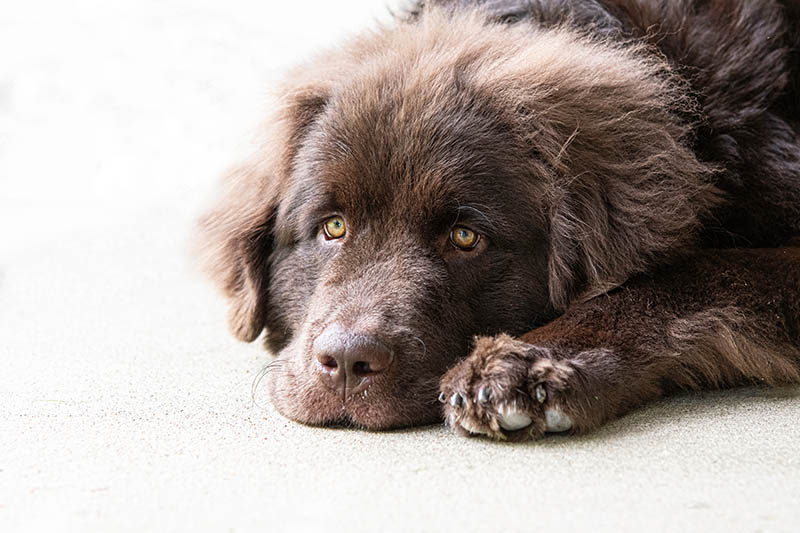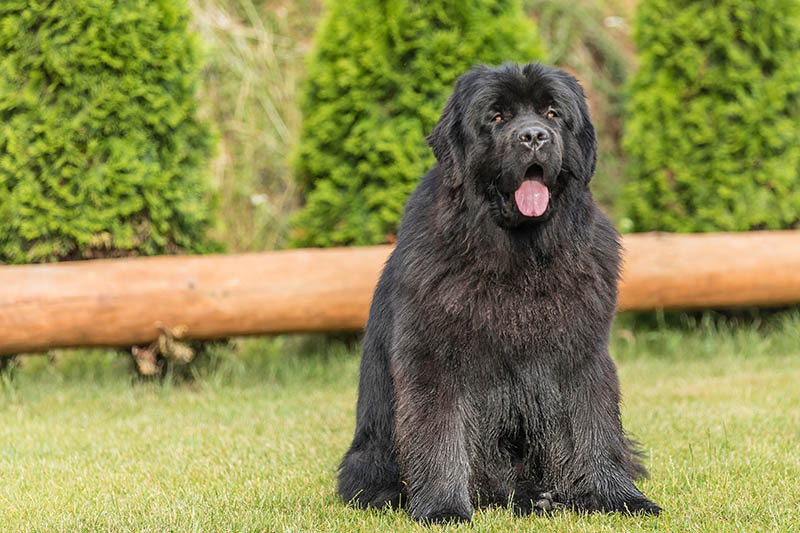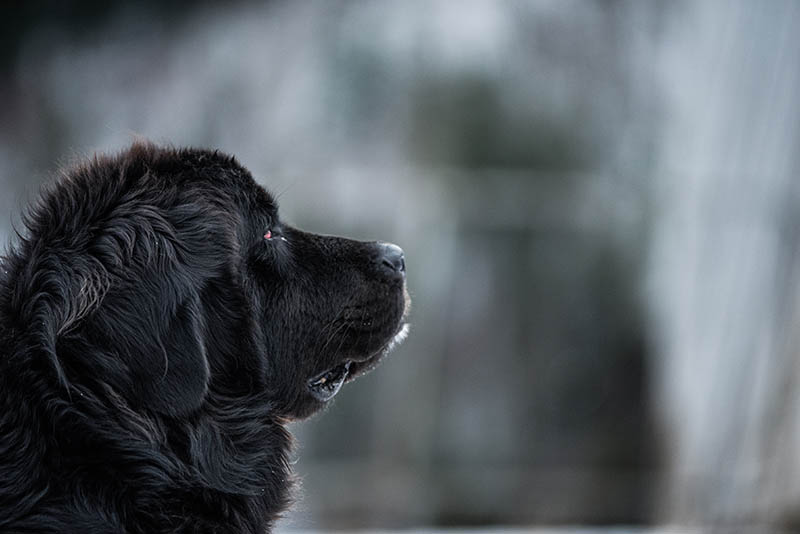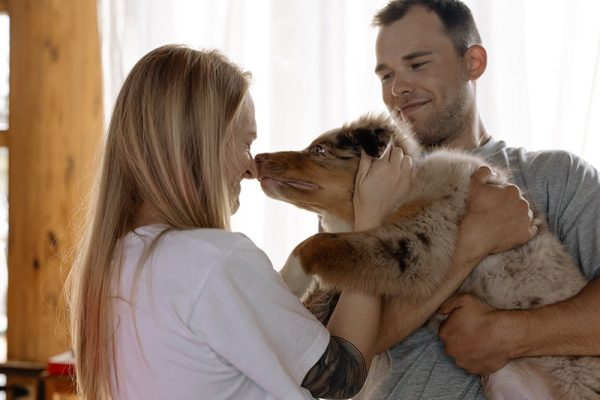The Newfoundland dog has a gentle nature and impressive strength. Their strong paws and remarkable lung capacity enable them to swim for long distances with little effort. They are also generally healthy, but if you want to learn more about possible health problems with this breed, keep reading as we list several issues that you will want to look out for to help keep your pet healthy.
This list is not exhaustive and is not a replacement for veterinary examination and adequate diagnosis. Please consult with your vet if you believe your Newfoundland has any health issues, but also to speak about regular checks and preventative healthcare.

The 10 Newfoundland Dog Health Conditions
1. Hip Dysplasia
- Signs: Decreased activity, decreased range of motion, lameness in the hind end, pain
Hip dysplasia is a genetic, multifactorial, and hereditary condition that causes the hip joint to form incorrectly, which causes it to wear down quickly and become unstable. It can lead to pain, swelling, arthritis, and lameness. Treatment usually involves weight management, medication, and surgery.

2. Elbow Dysplasia
- Signs: Limping, stiff elbow, pain, discomfort, exercise intolerance
Elbow dysplasia is similar to hip dysplasia, but it results from the elbow joint not forming correctly. It will cause many of the same problems, including pain, swelling, and difficulty getting up from a resting position. Medication, weight management, and surgery can help slow the progression of the disease.
3. Cardiac Disease
- Signs: Persistent and worsening cough even when resting, increased respiratory rate, tiring easily, weight loss
Congestive heart failure due to dilated cardiomyopathy, that causes the heart muscle to become weak and thin, is a term that means the heart can’t pump enough blood adequately for various reasons. It can progress slowly, so paying attention to any signs of lethargy and tiredness and seeking early veterinary help is important. Treatment usually includes lifelong medication and regular monitoring of disease progression with vet check ups and heart scanning.

4. Cystinuria
- Signs: Straining to urinate, frequent urination, blood in the urine, urinary blockage
Cystinuria is a genetic disorder that affects the kidneys and leads to the formation of cystine crystals and bladder stones. It can cause ongoing urinary tract issues and blockages. Dogs with cystinuria may require a special diet, medications, and even surgery to manage the condition.
5. Ear Infections
- Signs: Head shaking, dark discharge, odor, pain, itchiness
Dogs are more prone to ear infections than humans because of the shape of their ear canals, and the floppy ears of Newfoundlands can hold in dirt and moisture, which creates a good environment for bacteria to grow. Regularly checking and cleaning their ears with a pet-safe ear cleaner can help reduce the risk of infection. If a problem occurs, your vet will likely prescribe medication.

6. Gastric Dilatation and Volvulus or Bloat
- Signs: Dry heaves, retching, unproductive attempts to vomit, swollen and firm abdomen, anxiety, pacing, guarding their belly, panting and respiratory difficulties, collapse
Bloat is a multifactorial condition predominant in large and giant deep-chested dogs. The exact cause remains unknown, but there are several risk factors, such as type of food and number of meals per day, the animal’s temperament, their eating habits, feeding them too closely to exercise, and many others. It leads to a gas distension of the stomach that twists, blocking any gas and content exiting either side out of the stomach.
This leads to rapid and severe distension of the stomach and abdomen, as well as displacement, torsion of the spleen, compression of blood vessels leading to circulatory and respiratory difficulties, and eventually, collapse and stomach wall necrosis. This condition is fatal and needs emergency veterinary care no matter the time of day or night.
7. Epilepsy
- Signs: Seizures
Epilepsy is a brain disorder that causes recurrent seizures. The cause remains unknown but many suspect a genetic connection. Seizures can vary in appearance but usually include stiffening the neck and legs, paddling, involuntary urination and/or defecation, shaking/trembling, vocalizing, and drooling uncontrollably. They typically last 30–90 seconds, and your pet may seem confused or disoriented afterward.

8. Eyelid Issues
- Signs: Droopy eyes, inverted or inward turned (entropion) eyelid margins, everted or outward turned eyelid margins (ectropion), ocular discharge, squinting, corneal ulcers, eye redness
Newfoundlands may be prone to eyelid issues that cause their eyes to appear even more droopy. If the eyelids are droopy due to the excessive skin folds on the face, they may rub the surface of the eye, also referred to as the cornea, causing irritation and ulcers. This condition requires medical and surgical management.
Another common condition is the cherry eye, when the third eyelid gland prolapses and appears as a red, fleshy structure in the inner corner of the eye. Again, medical and surgical correction are required in the majority of cases.
9. Osteosarcoma
- Signs: Palpable swelling on a leg, pain, limping, decreased appetite, lethargy
Osteosarcoma is a type of a very painful and malignant bone cancer especially prevalent in large dogs like Newfoundlands, Boxers, Dobermans, Golden Retrievers and German Shepherds, and they will usually develop cancerous changes on their leg bones, commonly the radius, ulna, tibia, and fibula. But the femur, pelvis, or digits can also be affected. It is aggressive and frequently already spread at the time of diagnosis. Treatment can include surgery, chemotherapy, and medication.

10. Hypothyroidism
- Signs: Lethargy, weight gain, cold intolerance, reduced exercise intolerance, and dermatological signs, such as poor coat, darkening of the skin, and recurrent ear and skin infections
There are certainly breeds that suffer more commonly from hypothyroidism, but it may also occur in Newfies. This disease occurs due to reduced production of thyroid hormones. This disorder may be due to an autoimmune disease of the thyroid gland leading to inflammation, or because of gland atrophy, trauma, cancer, or other less common causes. The illness is diagnosed by your vet using blood tests and is managed medically for the rest of their life.

Tips for Keeping Your Newfoundland Healthy

- Provide a high-quality, balanced diet that meets the nutritional needs of your Newfoundland. Choose a brand that lists real meat as the first ingredient and is appropriate for your pet’s age and lifestyle.
- Engage your Newfoundland in regular exercise to keep them physically and mentally stimulated. These dogs are naturally strong swimmers and enjoy water activities. Long walks, hikes, and interactive play sessions are also beneficial, but when they are young, be cautious with intense exercise to protect their developing joints.
- Schedule regular check-ups with your veterinarian to monitor your Newfoundland’s overall health and catch any potential issues early.
- Stay current with vaccinations, flea-and-tick prevention, and lungworm and heartworm medication.
- Provide joint supplements if required and recommended by your veterinarian to promote joint health, and consider low-impact exercises like swimming to reduce stress on their joints. Be mindful of slippery surfaces that can increase the risk of injury.
- While Newfoundlands are active dogs, they require plenty of rest and sleep. Provide a comfortable and quiet resting area for your dog to recharge and recover.
- Maintaining a healthy weight is crucial for the overall well-being of a Newfoundland. Monitor their food intake, provide portion control, and avoid excessive numbers of treats. If you’re concerned about your Newfoundland’s weight, consult your veterinarian.
If you need to speak with a vet but can't get to one, head over to PangoVet. It's our online service where you can talk to a vet online and get the advice you need for your pet — all at an affordable price!


Conclusion
While most Newfoundland dogs are healthy and live 8–10 years on average, they might live longer and healthier lives with proper care and a bit of luck. Hip and elbow dysplasia are the most common health conditions that this breed can have, as these large dogs love to run around and play. Ear infections are also common, as their floppy ears can hold in moisture, creating a perfect environment for bacteria to grow. And their eyes are often droopy and may be associated with entropion or ectropion.
While the other issues are potential problems, they are less common. Talk to your vet whenever you’re concerned with your Newfoundland’s health, and get their advice on preventive care.
Featured Image Credit: Rhythmatique, Shutterstock






















